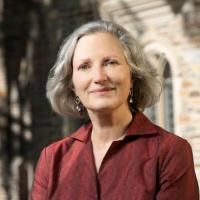Introduction: Caribbean Entanglements in Times of Crises
Abstract
Type
Department
Description
Provenance
Subjects
Citation
Permalink
Collections
Scholars@Duke

Michaeline A. Crichlow
I am interested in projects related to citizenship, nationalism and development mainly in the Atlantic and Pacific regions. My current projects are focused on the sorts of claims that populations deemed diasporic make on states, and how these reconfigure their communities and general sociocultural practices. I am also interested in development's impact on social and economic environments, and the way this structures and restructures people's assessments of their spaces for the articulation and pursuit of particular kinds of freedoms. I have attempted to project these perspectives in my recent book, "Globalization and the Postcreole Imagination: Notes on Fleeing the Plantation" (July 2009) and my current project: "Governing the Present: Vistas, Violence and the Politics of Place" that examines the quests for place and freedoms among populations in the Caribbean, Pacific and South Africa.
I am also an associate research fellow on a project called 50:50 at the Sir Arthur Lewis Institute of Social and Economic Studies (SALISES) at the University of the West Indies, Mona, Jamaica, that examines post-independence socio-economic developments primarily in the Anglophone Caribbean, and suggests new ways for rethinking development in the region. As well I am part of a SALISES international working group, on Rural Resilience and Agricultural Development Studies. The Agrarian component of my contribution to these projects, utilizes the arguments and methodology developed in my earlier text, "Negotiating Caribbean Freedom: Peasants and State in Development." Combining the theorizing of creolization in my recent text, "Globalization and the Post-Creole Imagination: Notes on Fleeing the Plantation," with issues of development particularly related to notions of resilience, sustainability, governance, processes of rural "othering," that emerge from this vibrant and highly productive project; I am better equipped to tackle the question of governance, violence, otherness, and the quest for freedoms-subjects centered in my new work.

Deborah Jenson
I am a scholar of "long 19th century" in French and Caribbean literature and culture, cognitive literary studies, global south philosophy, and health humanities. In the Fall of 2024 I hosted the semi-centennial conference of the Nineteenth Century French Studies Association at Duke University, and taught a new course with my colleague Felwine Sarr on Africana Philosophy. Running through all my research, teaching, and outreach is the problem of representation and mimesis, on axes from social contagion to rhetoric to mirror neurons. Here are some ways to think about my work:
- Research: recent articles on: Sylvia Wynter, cognitive exceptionalism, and Global South Philosophy in PMLA; Haitian psychiatrist Louis Mars in American Psychologist; Cognition in Keywords for Health Humanities, "Creole" poetry by Marceline Desbordes-Valmore in Cahiers Marceline Desbordes-Valmore), and qualitative representations of epilepsy in Epilepsy and Behavior. My most recent edited volume is a research topic with Marco Iacoboni and Len White on Representation in Neuroscience and Humanities in Frontiers. Monographs, edited volumes, editions, and translations include: Beyond the Slave Narrative: Politics, Sex, and Manuscripts in the Haitian Revolution; Trauma and Its Representations: The Social Life of Mimesis in Post-Revolutionary France; Poetry of Haitian Independence (with D. Kadish and N. Shapiro); Unconscious Dominions: Psychoanalysis, Colonial Trauma, and Global Sovereignty (with W. Anderson and R. Keller); Sarah, A Colonial Novella (with D. Kadish); and "Coming to Writing" and Other Essays by Hélène Cixous.
- Public humanities: co-founder and co-director of the Haiti Lab (2010-2013), founder and co-director of the Health Humanities Lab (2015-2020), and co-founder and co-director of the Neurohumanities Research Group (2013-) at the Duke Institute for Brain Sciences.
- Pedagogy: my teaching builds on the interdisciplinary nature of my work, from "Flaubert's Brain: Neurohumanities," "Pandemic Humanities: Reimagining Health and Medicine in Romance Studies," and "Trauma and Global Health," to "Mimesis in Theory and Practice," "Global Humanities in French," and "Sylvia Wynter and Caribbean Philosophy." After previously co-teaching with Felwine Sarr on African Philosophy, we are developing a course on African and Caribbean Philosophy.
- Administrative leadership: my experience at Duke includes directing the Franklin Humanities Institute, the Center for Latin American and Caribbean Studies, and co-directing the Brain & Society theme of Bass Connections, along with P.I.ship of grants including the Mellon "Humanities Futures" grant at FHI, and co P.I.ship with Ed Balleisen of the NEH Next Generation "Versatile Humanists" grant.
- For a profile of one of my remarkable undergraduate students in French, see this feature on Marshall Scholar Julie Uchitel: https://today.duke.edu/2022/05/duke-alumna-awarded-knight-hennessy-scholarship.
Unless otherwise indicated, scholarly articles published by Duke faculty members are made available here with a CC-BY-NC (Creative Commons Attribution Non-Commercial) license, as enabled by the Duke Open Access Policy. If you wish to use the materials in ways not already permitted under CC-BY-NC, please consult the copyright owner. Other materials are made available here through the author’s grant of a non-exclusive license to make their work openly accessible.
